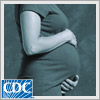This podcast is presented by the Centers for Disease Control and Prevention. CDC - safer, healthier people.
If you’re pregnant or thinking about getting pregnant, you don’t want to get sick with an infection. Some infections during pregnancy can hurt both you and your growing baby. Here are ten tips to prevent infection and help keep your unborn baby safe.
Wash your hands with soap and water often, especially after using the bathroom or handling pets, or if you get saliva or spit on your hands. It’s important to clean your hands before preparing food and eating, especially when touching raw meat, raw eggs, or unwashed vegetables. If you’re around people who are sick, or if you garden or touch dirt or soil, be sure to wash well and often. If soap and water aren’t available, use alcohol-based hand gel.
Try not to share forks, spoons, cups, or food with young children. Wash your hands often when you’re caring for and playing with children, especially after changing diapers. Children’s saliva and urine might contain a virus. It’s probably harmless to them, but it can be dangerous for you and your unborn baby.
Cook your meat until it’s well-done. The juices should run clear and there should be no pink inside. Don’t eat hot dogs, luncheon meats, or deli meats, unless they are reheated until steaming hot. Undercooked meats and processed meats might contain harmful bacteria.
Avoid unpasteurized milk and foods made from it. Don’t eat soft cheeses such as feta, brie, and queso fresco unless they have labels that say they’re pasteurized. Unpasteurized products can contain harmful bacteria.
Don’t touch or change dirty cat litter. Have someone else do it. If you must change the litter yourself, be sure to wear gloves and wash your hands afterwards. Dirty cat litter might contain a harmful parasite.
Stay away from rodents and their droppings. Have a pest control professional get rid of pests in or around your home. If you have a pet rodent, like a hamster or a guinea pig, have someone else care for it until your baby arrives. Some rodents might carry a harmful virus.
Get tested for sexually transmitted diseases, or STDs, such as HIV and hepatitis B, and protect yourself from them. Some people that have HIV, hepatitis B, or an STD don’t feel sick. It’s important that you know if you have one of these diseases. If you find out you do, talk to your doctor about how you can reduce the chance that your baby will become sick.
Talk to your doctor about vaccinations. Some are recommended before you become pregnant, during pregnancy, or right after delivery. Having the right vaccinations at the right time can help keep you healthy and keep your baby from getting sick or having life-long health problems.
Avoid people who have an infection. Stay away from people who you know have infections, such as chickenpox or rubella, if you’ve not had it yet yourself, or if you didn’t get the vaccine before pregnancy.
Ask your doctor about group B strep. About 1 in 4 women carry this type of bacteria, but don’t feel sick. An easy swab test near the end of pregnancy will show if you have this type of bacteria. If you do have group B strep, talk to your doctor about how to protect your baby during labor and delivery.
These are helpful tips, but this is not a complete guide to a healthy pregnancy. Be sure to talk to your doctor if you think you might have an infection, or might be at risk. To learn more about having a healthy pregnancy, visit www.cdc.gov.
To access the most accurate and relevant health information that affects you, your family and your community, please visit www.cdc.gov.



